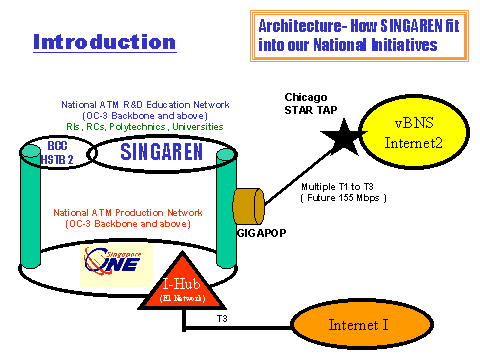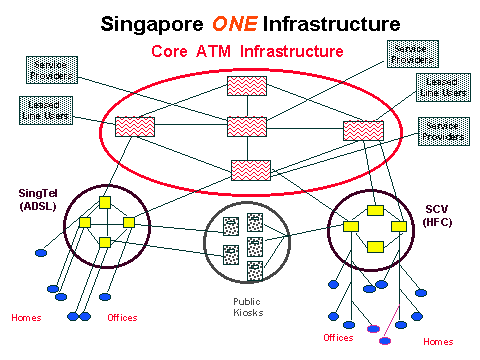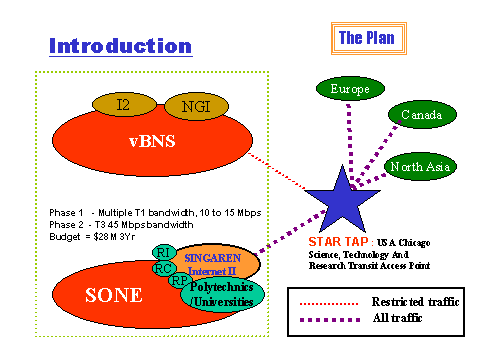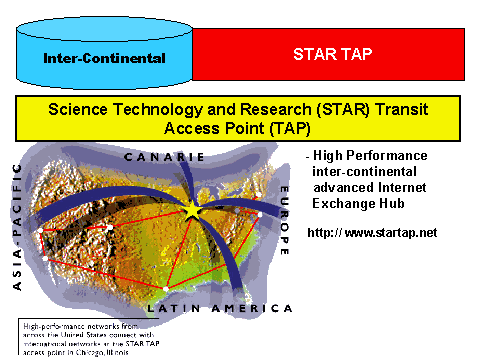High speed connection between
vBNS and SingAREN in Singapore
Shirley Ng Wai Man
National University of Singapore,
95, Yishun Street 81, #07-05, Singapore 768452
shirley@irdu.nus.edu.sg
- Abstract
-
Nearly all advanced developed nations have rapidly emerging high speed
national research and education (R&E) networks for broadband services
based on advanced network technologies. These advanced networks are connecting
with each other to form a giant nexus of technology, innovation, research
and development that will ultimately drive the engines of economic growth
in the new millennium. Such a global infrastructure will channel new technology
to the emerging global information infrastructure (GII) for business and
commerce.
This poster serves to bring the world attention to Singapore's participation
in the next-generation Internet technologies — Internet2, vBNS and
STAR TAP
— through SingAREN and S-ONE initiative in Singapore, to act as a research
hub drawing on technologies from different regions directly via inter-continental
links to USA and Europe, inter-regional links, national links and campus
networks.
- Keywords
-
SingAREN; Next generation Internet; High speed connection; Advanced
research and education
1. Introduction
Singapore Advanced Research and Education Network (abbreviated as SingAREN)
is an advanced network for research & education, and for the testing
of leading-edge broadband technologies. Its initial start-up is jointly
funded by the Telecommunication Authority of Singapore (TAS) and the National
Science and Technology Board (NSTB), and its key objective is to support
the research and education (R&E) community, which includes all the
tertiary institutes and the R&D institutes in Singapore.

In the SingAREN plan, all tertiary institutions and research organisations
beginning with Research Institutes and Research Centres (RI/RCs) will connect
at high speeds (155 Mbps and above) to the S-ONE backbone to have rapid
access to each others networks including the High Speed Network Testbed,
HSTB II. To create high speed access to overseas R&E networks, we propose
to follow the USA model of creating GigaPOPs (Gigabit network points of
presence), beginning with an SingAREN-GigaPOP that will interconnect with
the USA Chicago STAR TAP (Science, Technology And Research Transit Access
Point) for access into the USA vBNS backbone.
1.1. S-ONE
Singapore One Network for Everyone (S-ONE) is Singapore's national
high-capacity network platform started in 1996 to jump-start the development
of a national broadband info-communications infrastructure towards the
IT2000 vision.
S-ONE is a core ATM backbone network. High speed local access from home
can be achieved via Singapore Telecom ADSL network (up to 5.5 MBps downstream)
and Singapore Cable Vision's cable network (up to 10 MBps downstream with
coaxial cable).

See http://s-one.net.sg for more
information on S-ONE.
1.2. vBNS
The very high performance Broadband Network Service (vBNS), which
is funded by the National Science Foundation, provides a national infrastructure
for high performance networking as well as research that pushes the capability
of networks.

Member universities of Internet 2 are rapidly connecting to the vBNS
in support of their national-scale project in the applications and technologies
of advanced networks. The vBNS also plays a major role in the Next Generation
Internet (NGI) initiative.
See http://www.vbns.net for
more information on vBNS.
1.3. STAR TAP
The Science, Technology And Research Transit Access Point (STAR TAP)
is a persistent infrastructure, to facilitate the long-term interconnection
and interoperability of advanced international networking in support of
applications, performance measuring, and technology evaluations. The STAR
TAP anchors the international vBNS connections program.
Physically, it connects with the Ameritech Network Access Point (NAP)
in Chicago, as does the vBNS and other high-speed research networks. It
enables traffic to flow to international collaborators from the approximately
100 U.S. leading-edge research universities and supercomputer centers that
are now, or will be, attached to the vBNS or other high-performance U.S.
research networks.

See http://www.startap.net for
more information on STAR TAP.
1.4. Internet2
The Internet2 project, the joining of university community with
government and industry partners to accelerate the next stage of Internet
development in academia. Its mission is facilitate and coordinate the development,
deployment, operation and technology transfer of advanced, network-based
applications and network services to further U.S. leadership in research
and higher education and accelerate the availability of new services and
applications on the Internet.
See http://www.internet2.edu
for more information on Internet2.
2. SingAREN operations and services
SingAREN operations will provide an uncontested 'bearer' service that gives
reasonable assurance that there will be adequate bandwidth for carrying
out advanced Internet applications R&D by the SingAREN community. In
line with Internet2 objectives, it will progress from a best-effort service
to a differentiated communications service, which has the capability of
supporting an advanced communications and computational infrastructure
so as to meet the requirements of Singapore's growing research and education
community.
3. SingAREN projects
SingAREN is aimed to encourage other research and tertiary institutions
in Singapore to put up high quality projects which will quality under an
AUP, preferably those advanced applications research and development projects
with USA partner institutions involved and/or as part of a USA-Singapore
institutional or similar collaboration. The collaborative projects includes:
-
TeleImmersion Virtual Reality
-
Synchrotron Technology
-
XtalBench Technology
-
Kleisli & Ptool Research
-
Tele Education
-
TeleManufacturing/TeleDesigning
-
Tele Medicine
-
Digital Library Technology
See http://www.singaren.net.sg/html/collaborative.html
for more information on the above collaborative projects.
References




